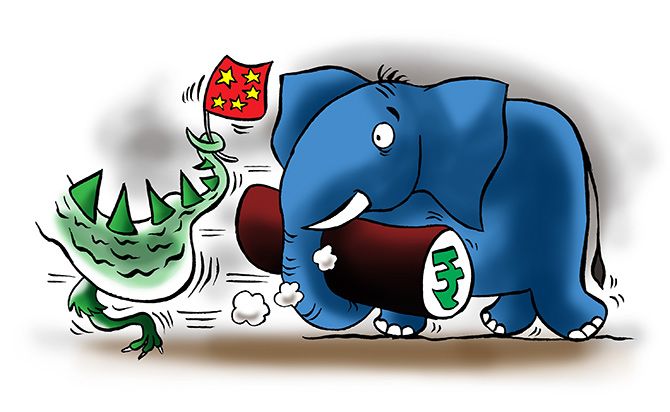'When we have a bad loan problem in our bank, we just cut it off.'
'India can take multiple approaches to tackle the bad loan problem instead of pumping cash.'
Illustration: Uttam Ghosh/Rediff.com

Daniel Wu, bottom, left, chairman of the Asian Bankers Association (ABA), says there is merit in merging some of the less efficient public sector banks in the country.
In Mumbai for ABA’s annual conference, Wu, who is also president of Taiwanese banking unit CTBC Holding, tells Abhijit Lele the Centre is taking all right steps for better growth. Excerpts:
You’re visiting India at a time when the economy is showing some early signs of recovery after slow growth. Do you share optimism about better growth prospects? If yes, why?
The central government headed by Prime Minister Narendra Modi is doing all right things for supporting growth of the Indian economy.
Demonetisation and the roll out of the Goods and Services Tax (GST) are good for the Indian economy.
These may have short-term hiccups. The cash has huge costs associated with it. India, and China are expected to grow at over five per cent.
I am very optimistic about growth in the next 10 years for India and Asia.
You are talking about the attractiveness of India for foreign investors. Banks in India are saddled with a large pool of bad loans from the corporate and infrastructure sectors. It is constraining the capacity for investments. What is the role global investors can play to get over this challenge?
The new Insolvency and Bankruptcy Code, 2016, is the right thing to do.
These bad loan problems do not happen just in India but in every country in terms of economic development.
 When you come into this stage, you can borrow from experiences of other countries to take care of these problems.
When you come into this stage, you can borrow from experiences of other countries to take care of these problems.
In China, they separated good loans and bad loans.
They created four asset management companies, where the government took a majority stake.
Bad loans were transferred to ARCs (asset reconstruction companies) which has people focused on bad loans.
And they injected capital into good banks to do more things.
When we have a bad loan problem in our bank, we just cut it off.
Maybe sell at 30 cents or 50 cents for a dollar because we just do not have the time to do collection and process.
What approach would be apt in the Indian banking environment?
In India, 70 per cent of banking assets are held by public sector banks. Normally public sector in every country is less efficient than private sector from the economic perspective.
I heard about the government’s plan to inject Rs 2.11 trillion (Rs 2.11 lakh crore) in these banks to take care of the bad loan problem.
My experience suggests you may not reach the purpose you are thinking of.
It will be discounted. Instead, the government can take multiple approaches to tackle the bad loan problem.
And not just keep pumping cash as new bad loans will emerge.
Looking at the vast size of the Indian market and population, do you subscribe to consolidation among state-owned banks so they gain size and have better shock absorption capacity?
Normally people do not have ratios such as return on equity and return on assets to assess performance of national banks.
These could be simple benchmarks to measure their performance. Some of the less-efficient banks could be merged. It will be good for the market.
You have shown a lot of optimism about India. What are the plans for your bank’s branches in India?
We have two branches in New Delhi and Chennai.
We have given backing of $50 million as a capital for the Indian branch operations.
Most of it is in the corporate business with 70 per cent of domestic clients.
The bank also has exposure to Indian companies through the bank’s Singapore branch in the form of external commercial borrowings.
We see many opportunities to grow our business here, given the economic growth potential in India.











